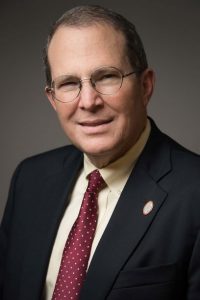
In his 2019-2020 State of the University Address, Chancellor Steve J. Schwab, MD, Monday said the University of Tennessee Health Science Center is “weathering COVID in a lean, but strong fashion.”
Speaking via Zoom in his 11th-annual State of the University Address, the chancellor said the university has “maintained our budget, maintained our workforce, and expanded our mission.” He thanked everyone involved for their work in keeping UTHSC “on track” toward his long-term goal of being ranked in the top quartile of the nation’s academic health science centers and continuing to progress in the “new normal” necessitated by the pandemic.
Chancellor Schwab cited many successes for the university achieved during the pandemic, including graduating all students, residents, and fellows on schedule. “We have led people into the health care workforce,” he said. “We have met all of our clinical obligations. We have put research on track and growing.”
The chancellor cited work by the College of Medicine to open one of the first drive-through COVID-19 testing sites in Memphis and to establish laboratory capability to analyze up to 1,500 COVID tests per day for the university and many of its clinical partners. He also mentioned work being done on campus with multiple research partners in vaccine development and to identify therapeutics for the virus. “Our response to COVID by both our clinical departments and our basic science departments has been remarkably successful,” he said.
UTHSC achieved a successful virtual accreditation visit from the Southern Association of Colleges and Schools Commission on Colleges. The College of Pharmacy has continued to be ranked nationally as a Top 20 College of Pharmacy and its NIH funding rankings have risen. The university’s partner teaching hospital, Le Bonheur Children’s Hospital, again is ranked as one of the nation’s Top Children’s Hospitals.
“Clearly, although COVID is real, it has not stopped our ability to create distinctions,” he said.
The university’s budget, which the chancellor described as “an evenly divided, diversified budget,” grew, an achievement for a higher education institution during a pandemic.
Roughly $306 million was generated in clinical revenue, which pays for clinical faculty salaries and maintains the clinical educational operations. Sponsored programs (all-source non-clinical grants and contracts) accounted for a record $309 million. And $308 million came from state appropriations and tuition. He described next year’s budget position as “strong, but lean.” He said the university will again push for restoration of the annual operational funding increases, which were removed from UTHSC and other specialty institutions five years ago under a new higher education funding formula.
Chancellor Schwab said the Campus Master Plan, under the direction of Executive Vice Chancellor and Chief Operations Officer Ken Brown, JD, MPA, PhD, FACHE, continues to deliver “best-in-class facilities to make sure we, as an institution, don’t get left behind.”

The chancellor pointed to the new Delta Dental of Tennessee College of Dentistry Building beginning construction this year on the Memphis campus; the renovation of the Historic Quadrangle in the center of the Memphis campus, which will provide a new home for the College of Nursing; and the renovations to the Nash and Nash Annex Buildings that will bring the university more than 100,000 square feet of state-of-the-art wet lab space.
He also mentioned that the university has successfully acquired the TriMetis Building near UTHSC research buildings and the College of Pharmacy in Memphis to provide new vivarium space, and is finishing renovations to the former UT Conference Center in Knoxville to provide a new home for the Audiology and Speech Pathology program there, as well as additional educational and research space in Knoxville.
In the educational mission, enrollment has continued to grow, he said, with a total of 3,188 students, and the number of residents and fellows is up to 1,496. The university awarded more than 1,000 degrees with a 95 percent graduation rate and first-time board pass rate for graduate and undergraduate students.
The chancellor said the university is increasing its clinical training capabilities and described its partner hospital agreements as “dynamic and changing” to meet the needs of both the hospitals and the university. UTHSC is expanding relationships with West Tennessee Healthcare; Regional One Health, Baptist Memorial Health Care, and the Memphis Veterans Affairs Medical Center in Memphis; Ascension Saint Thomas in Nashville; Erlanger Health System in Chattanooga; and UT Medical Center in Knoxville. These education expansions and the clinical faculty growth will offset reductions in educational, resident, and faculty numbers at Methodist University Hospital in Memphis and allow continued educational growth for UTHSC.
“We span the state with all our teaching sites,” he said. “We are diversifying our clinical footprint to meet our educational footprint.”
Chancellor Schwab said across all its missions, the university is absolutely committed to diversity and inclusion in its student body, faculty, and staff. “We need a diverse campus that reflects Tennessee,” he said. “We need a health care workforce that reflects Tennessee.”
The chancellor summed up his address saying UTHSC’s clinical volume is at a national-caliber level, but the university still needs a nationally ranked adult hospital. The educational mission is also performing at a national-caliber level and program offerings are being expanded for more success. Research is on track at $100.9 million in grant awards, up slightly from last year’s total, and is poised to continue growth.
The 2019-2020 State of the University Address is available on the Messages from the Chancellor web page.
